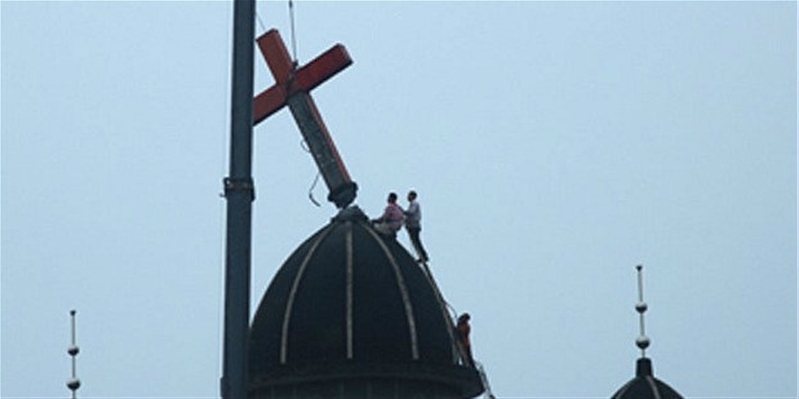
Christians in China's Zhejiang province have challenged local authorities of the Communist Party by putting back crosses knocked down in the government's campaign. The cross is considered a traditional symbol of Christianity.
In an exclusive report by Robert Marquand of the Christian Science Monitor, police in Zhejiang have taken down crosses from more than 450 churches since December 2013, according to Texas-based ChinaAid. However, some Christians have taken the avenue of civil disobedience, putting up makeshift crosses to replace the ones confiscated by the government.
"The churches are restoring their cross over and over again," former journalist Zan Aizong, a local evangelical, said. "They are being bold and very courageous."
According to Marquand, the state has engaged in a campaign to target Protestants where their numbers are growing and their churches are highly visible. Christian pastors in China feared that a larger crackdown on their religion may happen in the future.
"The recent pushback began in May after the provincial government announced that crosses must come off all churches in the province," Marquand wrote. "That brought a rare open letter from the region's largest evangelical church stating that the policy is 'likely to cause chaos ... and religious conflicts.'"
Marquand termed the Chinese government's campaign against Christianity as the "three rectifications and one demolition" policy. He noted that unlike previous campaigns, the current one has lasted two years so far.
"It has been part of a media campaign aimed at churches, and now includes the infiltration of congregations in Wenzhou in the attempt to discover party members and their families who worship," Marquand wrote. "In the Communist party-state, being both Christian and a party member is not allowed."
According to Marquand, even Protestant "Three-Self" churches have been the target of government persecution, despite the fact they are legally registered and considered loyal to the Chinese state. The government has also cracked down on "house" churches in Zhejiang, which it considers illegal.
"For the past two years, more Three-Self churches are being targeted, so we can expect more resistance from them," Beijing-based human rights lawyer Teng Biao, who currently works in residence at Harvard Law School, said.
Marquand reported that the government stopped tearing down crosses in an arbitrary manner. However, it issued a new "religious structures building code" where it would require crosses to be smaller in size and blended in with the same color as the building.
"The leadership of Chongyi Christian church in Hangzhou - one of the largest mega-churches in China with more than 10,000 weekly visitors - openly protested the new policy," Marquand wrote. "The protest letter ran on the church website but disappeared after a week."
Teng told Marquand that the letter from Chongyi Christian church was "important, since the Three-Self churches tend to be supportive of the government." The letter cited the country's constitution, arguing that the government has to follow "rules that respect the traditions and customs of all religions."
"The letter goes on to state that building and architectural codes in cities have always been adapted to specific places and structures, and a blanket ban on all crosses goes past the legal scope of the code," Marquand wrote.
The church's letter contended that enforcing the new rules would probably "cause chaos in execution and religious conflicts." The letter's authors also slammed the government's attempts to take down crosses as "excessive interference."
According to Marquand, China has between 50 and 100 million Protestants and about 6 million Catholics; in contrast, the Communist Party has 70 million members. However, the government has officially declared China an atheist country.







